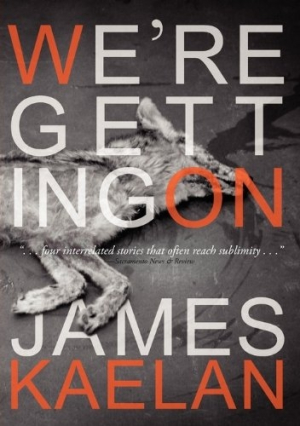We're Getting On
The three nearly-connected stories in James Kaelan’s debut collection are remarkable for their surreality, bleakness, and linguistic acrobatics. Alone, each story comments on the nature of storytelling, from the desire to escape through fantasy to the necessity of words at all. Collectively, they tell a single tale of human struggle against isolation and despair.
Kaelan’s short piece, “The Surrogate,” chronicles a two-month romance contained entirely in one apartment, as the narrator attempts to profess his love for a girl he barely knows. The language is nothing short of exuberant, and the humor Kaelan achieves through wordplay at first distracts from, then underscores, what becomes a gruesome and weirdly touching story.
“You Must’ve Heard Something” is just as claustrophobic. In it, two survivors of an undefined catastrophe find themselves trapped in adjacent apartment buildings and distract one another in shared fantasy. The rotting apples they survive on become delicious herring; the champagne they drink when the apples run out is a celebration. As the pair fights starvation, fear, and exhaustion, they become lost in their delusions. Meanwhile, a very real threat, the riots sweeping through their city, moves steadily closer.
The title novella is a new take on the typical survival tale: an unnamed narrator leads a troupe of city hipsters into the wilderness. Immediately, things do not go well. The meager garden is destroyed by an unexpected frost, their bodies wither from sickness and malnutrition, and efforts to hunt fail spectacularly. But the narrator’s goal for his band is exactly this: not to survive in the wild, but to slowly decompose. “The garden has to die, or I have to kill it,” he states, “then kill an animal with my spear, discard my spear, try to kill something else, such as a hawk with a rock, fail at that, find a dead animal somewhere, eat part of it, search for another carcass, fail to find it, and I’ll be getting on.” The narrator’s pledge to cleanse himself of anything manufactured grows to include the concept of time, clothing, and ultimately words themselves, as the prose deteriorates along with his health and mind.
The book’s publication is notable: the publisher is purchasing carbon credits to offset the book’s environmental footprint, and Kaelan is launching a zero-emissions bike tour in July. The book itself is made from 100% recycled paper, the cover embedded with seeds. If put into the ground, it will decompose, then grow.
The narrator of “We’re Getting On” explains, “my concern is less with degeneration, which is inevitable, than with when we deteriorate.” This, too, is the author’s concern: repeatedly, he traps his characters and charts their decline. We’re Getting On finds people living in dire circumstances, not always surviving, and in his thoughtful and carefully controlled debut Kaelan mines this bleak territory to find his own meaning and truths.
Reviewed by
Michael Beeman
Disclosure: This article is not an endorsement, but a review. The publisher of this book provided free copies of the book to have their book reviewed by a professional reviewer. No fee was paid by the publisher for this review. Foreword Reviews only recommends books that we love. Foreword Magazine, Inc. is disclosing this in accordance with the Federal Trade Commission’s 16 CFR, Part 255.

